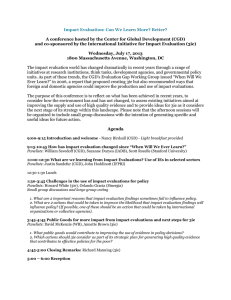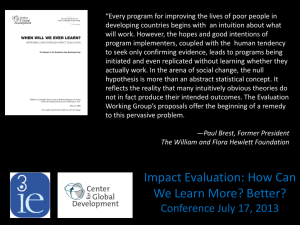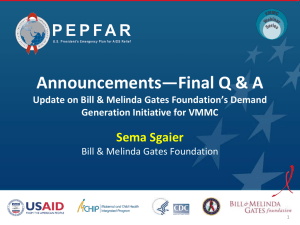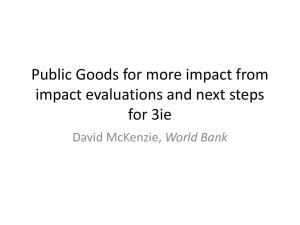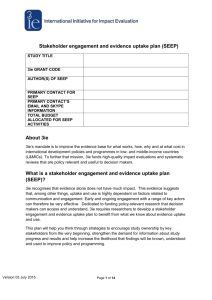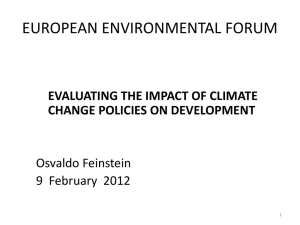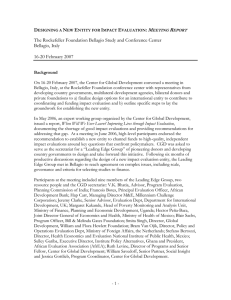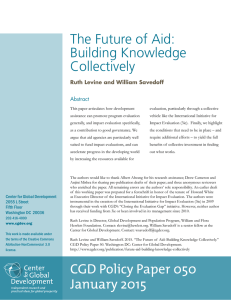5 March 2008 International Initiative for Impact Evaluation (3ie) Proposed Founding Document
advertisement
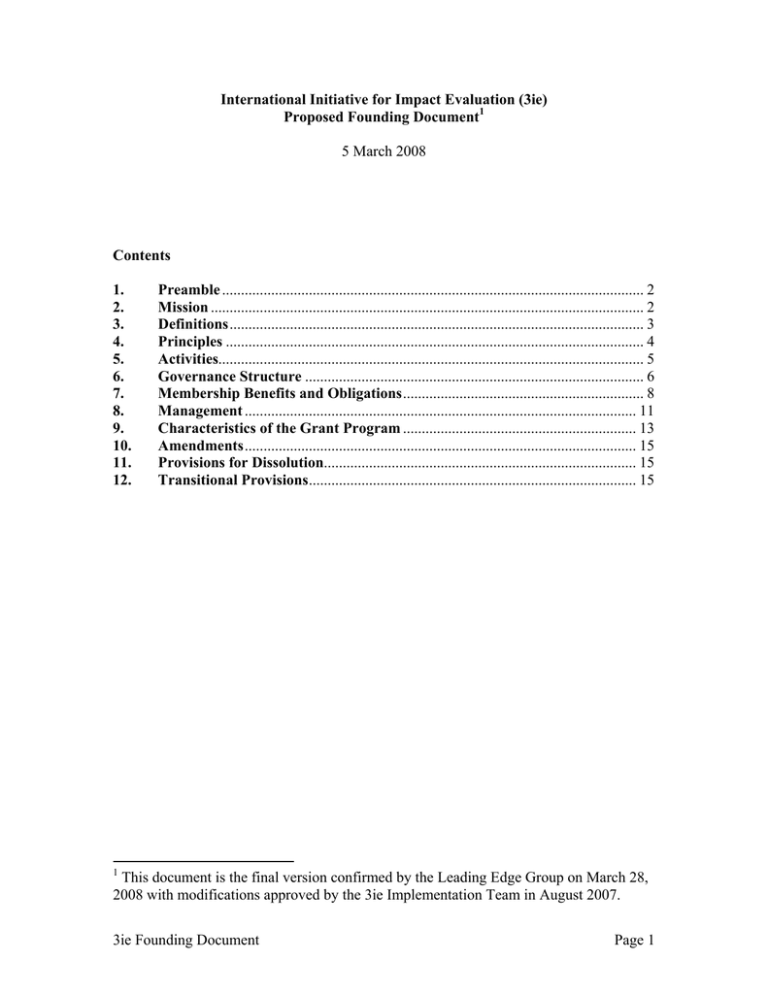
International Initiative for Impact Evaluation (3ie) Proposed Founding Document1 5 March 2008 Contents 1. 2. 3. 4. 5. 6. 7. 8. 9. 10. 11. 12. Preamble ................................................................................................................ 2 Mission ................................................................................................................... 2 Definitions.............................................................................................................. 3 Principles ............................................................................................................... 4 Activities................................................................................................................. 5 Governance Structure .......................................................................................... 6 Membership Benefits and Obligations................................................................ 8 Management ........................................................................................................ 11 Characteristics of the Grant Program .............................................................. 13 Amendments........................................................................................................ 15 Provisions for Dissolution................................................................................... 15 Transitional Provisions....................................................................................... 15 1 This document is the final version confirmed by the Leading Edge Group on March 28, 2008 with modifications approved by the 3ie Implementation Team in August 2007. 3ie Founding Document Page 1 1. Preamble To contribute to the fulfillment of aspirations for wellbeing, collective efforts are underway to strengthen the respect for human rights, to reduce poverty, and to improve health, education, standards of living, and physical security around the world. These collective efforts take myriad forms and vary in their effectiveness and efficiency. Such efforts can be more successful and have greater impact in contributing to these universal aspirations when they are based upon the lessons from systematically documented experiences and evidence. The evidence generated by impact evaluations – measurement of the net effects of particular programs or interventions – is one form of knowledge that can inform public and private decisions to improve social and economic development programs in low- and middle-income countries. Such evidence is a public good that tends to be undersupplied without collective efforts to mobilize sufficient investment. Impact evaluations have produced good evidence on certain questions and many initiatives today are effectively generating and expanding this work. Nevertheless, a collective effort with distinctive features could enhance these activities and accelerate progress. Therefore, an international effort of willing partners has agreed to collaborate in lifting some of the constraints that hinder the production and use of such systematic evidence in policymaking, with attention focused on the subset of evaluation studies that measure impact. This document establishes the mission, activities, structure, and scope of an independent non-profit institution, governed by a diverse voluntary membership, provisionally called the International Initiative for Impact Evaluation (3ie). 2. Mission The mission of the International Initiative for Impact Evaluation (3ie) is to contribute to the fulfillment of aspirations for wellbeing by encouraging the production and use of evidence from rigorous impact evaluations for policy decisions that improve social and economic development programs in low- and middle-income countries. 3ie Founding Document Page 2 3. Definitions For the purposes of this document, the following definitions will be used: Rigorous impact evaluation studies are analyses that measure the net change in outcomes for a particular group of people that can be attributed to a specific program using the best methodology available, feasible and appropriate to the evaluation question that is being investigated and to the specific context. Social and economic development programs are interventions whose primary purpose is to improve a population’s quality of life, whether they are financed by public agencies, NGOs or private institutions. This includes programs aimed at improving health, education, employment, incomes, access to credit, infrastructure, and reducing poverty, among others. Low- and middle-income countries are categories for which 3ie will adopt the definitions of the World Bank’s country classification system. Members Institutions are eligible organizations that fulfill the obligations of membership. Member Institutions can be ministries or public agencies (bilateral, multilateral), private non-profit institutions, or non-state organizations whose core mission is to finance or implement social and economic programs in low- and middle-income countries and that are committed to the mission of 3ie. Associate Member Institutions are eligible organizations whose core business is to conduct impact evaluations, such as universities, research institutions and consulting firms. Organizations eligible to be members may elect to hold associate member status for up to two years. 3ie Partners are organizations – including evaluation associations, advocacy groups, civil society groups, or others – that demonstrate they share in and support 3ie’s mission (See Section 2). 3ie Founding Document Page 3 4. Principles 3ie will engage with all stakeholders in a spirit of collaboration, mutual empowerment and respect, recognizing and valuing the unique contributions that distinct parties bring to the shared endeavor of improving human wellbeing through better-informed policy decisions. 3ie will be: - responsive to appropriate stakeholders when identifying questions, assessing policyrelevance, and providing technical support; - strategic and selective in its choice of impact evaluation questions and funded studies; - transparent in its decision-making; and - independent in its technical reviews of impact evaluations and syntheses of evidence. 3ie will seek to conduct its activities in collaboration and cooperation with other parties, complementing governments, organizations, groups and initiatives that: - conduct or improve other forms of monitoring and evaluation; - promote, finance, or conduct rigorous impact evaluations and the use of evidence for decision making; - strengthen local capacity for conducting and using impact evaluations; and - improve impact evaluation methodologies. 3ie will strive to promote and finance impact evaluations that: - meet high standards of evidence; - address questions that are relevant and important to public policy decisions; - contribute evidence that leverages information from other sources and studies; - pioneer new methods of data collection and analysis; - engage appropriate stakeholders; and - are less likely to be financed through other sources because of longer time frames, larger expense, or greater complexity. 3ie Founding Document Page 4 5. Activities 3ie will undertake activities that contribute to its mission and that complement and support other initiatives with similar aims. It will concentrate on activities that are not conducted by other organizations and that are ideally suited to its character as an independent non-profit institution governed by a diverse voluntary membership. In conformance with these criteria, 3ie will: - identify enduring questions about how to improve social and economic development programs through structured consultation with Member Institutions and others in order to catalyze comparable studies on selected issues and ensure that studies promoted by 3ie are needed, relevant and strategic; - identify programs that represent opportunities for learning so as to encourage impact evaluations in those instances where studies are feasible, findings can affect policy, and results, when combined with other sources of information, will advance practical knowledge; - adopt quality standards to guide its reviews of impact evaluations through periodic technical consultations; - finance the design and implementation of impact evaluations that address questions of enduring importance to policymaking in low- and middle-income countries; - Prepare or commission syntheses of impact evaluations to link the findings from individual studies with broader policy questions; - advocate for the generation and use of impact evaluations; - share and disseminate information about opportunities for learning, planned studies, designs, methods, and findings; and - promote the mutual development of capacity to conduct rigorous impact evaluations and to use evidence in policymaking in low- and middle-income countries. Other activities that contribute to fulfilling 3ie’s mission can be undertaken, depending on resources, opportunities, or Member Institution interest, taking care not to duplicate activities being carried out effectively by other organizations. 3ie Founding Document Page 5 6. Governance Structure 3ie is constituted as an independent non-profit institution, with a diverse membership, that will be governed by a Members Conference and a Board of Commissioners. The Members Conference includes one (1) representative from each Member and Associate Member Institution. Only Member Institutions have voting rights and they collectively: - appoint the 3ie Commissioners; - approve membership obligations – both financial and non-financial; - make final determinations regarding whether or not a Member Institution has fulfilled membership obligations; - commission operational performance evaluations every three (3) years; - approve amendments to the Founding Document; and - commission annual financial audits. The Board of Commissioners (hereafter, “The Board”) comprises five individuals appointed by the Members Conference to serve three-year terms (with a maximum of three consecutive terms). At least two of the Commissioners will be selected for their experience with the use of impact evaluation studies in policymaking in low- and middleincome countries and demonstrated commitment to evidence-based policymaking. At least one Commissioner will have expertise in financial and operational oversight. The Board will: - hire and supervise the Executive Director; - approve the annual work plan and budget; - evaluate the performance of 3ie and the Executive Director annually; - negotiate fulfillment of membership obligations with Member Institutions and, if appropriate, recommend actions to be taken by the Members Conference; and - consult actively with Member Institutions and other appropriate stakeholders. Member Institutions will appoint staff members to provide formal representation to forums convened by 3ie to: - debate and select enduring questions; - provide information about planned and completed evaluation studies; - provide information on the Member Institution’s relevant social or economic development programs at the earliest stage that is feasible, congruent with the Member Institution’s legal and operational norms; and - identify opportunities for collaboration and coordination with 3ie and other Member Institutions. 3ie Partners and other interested parties will be regularly informed of 3ie’s activities and invited to participate in forums convened by 3ie at the discretion of the Director. Such groups will include ministries or public agencies (bilateral, multilateral), private nonprofit institutions, non-state organizations, research institutes, and professional associations that share a commitment to 3ie’s mission and that finance, implement, or evaluate social and economic programs in low- and middle-income countries. 3ie Founding Document Page 6 3ie Governance Structure Members Conference (Representatives from all Member & Associate Member Institutions*) Board of Commissioners (5) •Appoints Commissioners Appointed by Members Conference 3-year terms •Approves membership requirements •Commissions performance evaluation and financial audits •Hires/Fires Executive Director •Approves budget •Evaluates performance annually •Consults actively with Member Institutions and other appropriate stakeholders 3ie Partners •Participation in 3ie activities (e.g. enduring questions) •Notice of requests for proposals •Identify opportunities for collaboration and coordination Executive Director •Hires/Fires staff Member Advisory Group •Signs contracts (Liaison officers appointed by Member Institutions) •Approves grants •Debate and select enduring questions •Programs activities •Provide information (studies, planned projects, etc.) •Supervises and convenes consultative processes (e.g. enduring questions, standards, selection of expert review panels) •Identify opportunities for collaboration and coordination Interested Parties (Appropriate stakeholders) •Opportunities to provide inputs on 3ie’s activities •Invitation to 3ie organized events Program Staff *Associate Members do not have vo ting rights 3ie Founding Document Page 7 7. Membership Benefits and Obligations Member Institution Benefits All Member Institutions will have the same benefits of membership and equal engagement in the governance of 3ie. Priority for funding: Once they have satisfied all the conditions and have passed the review process, research proposals from Member Institutions will receive priority over proposals from non-Member Institutions. Input on enduring questions: Member Institutions will participate formally in selecting enduring questions that will be the object of 3ie’s solicited proposals. Coordination: Member Institutions will be able to exchange information on planned and ongoing impact evaluations and reach agreements on clustering research around themes or areas of common interest. Technical review: Member Institutions will have access to technical review services and networks of researchers developed in the course of 3ie’s work. Learning: Member Institutions will have regular contact with an organization that is generating useful information on topics related to their work. Recognition of good governance: Member Institutions will benefit from being associated with an organization that has the explicit aim of generating knowledge for better results – a reflection of “good governance.” Member Institution Obligations Membership in 3ie is voluntary and becomes effective upon fulfilling the obligations of membership as established by the Members Conference. Member Institutions can withdraw from 3ie after fulfilling all outstanding commitments and giving appropriate notice, as determined by the Members Conference. For the purpose of defining financial obligations of membership, Member Institutions will initially be classified into one of the following categories: - Low-income country government ministry or agency - Middle-income country government ministry or agency - Multilateral development bank - Bilateral development agency - Private non-profit institution - Non-state organizations All Member Institutions contribute financially to support the activities of 3ie. Financial contributions to 3ie may be direct or indirect so as to accommodate the character, norms, 3ie Founding Document Page 8 and legal restrictions governing each participating institution. All members are urged to provide unrestricted contributions to 3ie; however, Member Institutions may also fulfill their financial obligations to 3ie by commissioning impact evaluations with budget allocations that include fees for the full cost of support services provided by 3ie. The minimum contributions may differ in relation to the membership categories listed above. The Board of Commissioners will propose specific amounts for consideration of and approval by the Members Conference. All Member Institutions will contribute funds for, directly commission, or implement impact evaluations to expand the evidence-base for policymaking in low- and middleincome countries. The amount and character of these obligations will be proposed by the Board of Commissioners and approved by the Members Conference. Member Institutions or their appointed representatives will: - participate in the Members Conference deliberations and decisions; - advise the Board of Commissioners on selecting the Director; - inform 3ie of the Member Institution’s planned social and economic development programs, as early as possible; - provide 3ie with impact evaluations conducted by or funded by the Member Institution along with primary data for re-analysis when possible and with appropriate safeguards for confidentiality and protection of ethical standards; - encourage qualified staff to participate in 3ie’s grant review panels and methodological discussions; - commit to applying rigorous standards for impact evaluation studies, informed by the standards adopted by 3ie in the course of its periodic consultations and reviews; and - commit to collaborate and coordinate with other institutions engaged in similar activities to maximize complementarity and reduce unnecessary duplication. Management will review each Member Institution’s standing with respect to the fulfillment of membership obligations every three (3) years, and enter into discussions if there are any questions that obligations have not been met. If these discussions do not conclude satisfactorily, Management can recommend that the Board of Commissioners enter negotiations with the Member Institution whose fulfillment of membership obligations is under question. If those negotiations do not conclude satisfactorily, the Board of Commissioners may present the issue to the Members Conference, which will make any final determination regarding membership status. 3ie Founding Document Page 9 Associate Member Institutions Benefits and Obligations Associate Member Institutions will enjoy the following benefits: • They can participate in the Members Conference deliberations (but do not have voting rights); • They may be invited to participate in 3ie’s information exchange and knowledge building activities; and • They may be invited to participate in technical review panels and methodological discussions. • Associate members will be automatically informed of 3ie’s requests for proposals To be considered for Associate Membership status, the institution is obligated to demonstrate its continuing commitment to promoting rigorous impact evaluation work in developing countries. This obligation can be fulfilled by submitting a significant share of their own impact evaluations to 3ie for assessment or by providing alternative acceptable evidence of adherence to appropriate standards. Institutions eligible to be members should show commitment to initiating impact evaluation work, which may count toward an in-kind contribution for their transition to full membership. 3ie Partners Benefits and Obligations 3ie Partners will benefit from inclusion in 3ie’s outreach, consultation and dissemination activities. In particular, they may be invited to participate in information exchange, knowledge building activities, technical review panels, selection of important research questions, and methodological debates. To qualify as a 3ie Partner, the candidate institution must submit a formal request to 3ie that demonstrates its own mission and activities substantially support and further 3ie’s mission (See Section 2). 3ie Founding Document Page 10 8. Management The Executive Director will be responsible for: - organizational design and development; - hiring and supervising staff; - strategic planning; - proposing an annual budget and work plan to the Board of Commissioners; - executing the approved budget; - programming and supervising activities to fulfill 3ie’s mission; - proposing policy changes and Founding Document amendments to the Board of Commissioners and Members Conference as necessary; - reviewing fulfillment of membership obligations by Member Institutions; and - conducting 3ie’s business in accordance with the Principles enumerated in Section 4 of this Founding Document. In addition, the Executive Director and Staff will have the authority to: - manage technical peer reviews of proposed and completed impact evaluation designs and studies; - approve and execute grants; - monitor funded studies to assure compliance with the standards adopted by 3ie; - issue requests for proposals on identified enduring questions; - solicit funds from and provide services to Member Institutions; - convene meetings and commission work to guide 3ie in setting standards for rigorous impact evaluations; - collect and disseminate impact evaluation studies; - Prepare or commission syntheses of impact evaluations to link the results of the individual studies with broader policy questions; - manage and disburse funds; - publicly disseminate information about 3ie, its mission, activities and membership through a dedicated website and other media; - conduct activities that advocate for the production of rigorous impact evaluations and the use of the information they generate; - convene meetings of the Members Conference and Board, and provide organizational and logistical services for those bodies; - submit operational and financial reports of 3ie activities to the Members Conference and Board; - coordinate 3ie’s work program and activities with Member Institutions, other appropriate stakeholders, and other initiatives that share the aims of 3ie’s mission; and - other activities necessary to fulfill the mission as established by the Members Conference and Board of Commissioners. To fulfill these responsibilities, 3ie’s Management will be organized to address three operational requirements: general administration, grant administration, and technical services. 3ie Founding Document Page 11 General administrative functions include, but are not limited to management of funds, office space, equipment and maintenance, and personnel. Grant administration will include but not be limited to drafting requests for proposals, encouraging applications for funding, administering the grant review process and administering the peer review processes for completed studies. Technical services will include but not be limited to identifying technical experts to serve on grant review panels and peer review panels of completed studies, assuring public access to impact evaluation studies and primary data generated by 3ie activities, advocating for the production of impact evaluations and the use of information they generate; and serving as a technical resource for Member Institutions. Technical services will be provided by senior professionals with internationally recognized expertise in the methods and practice of rigorous impact evaluations to the greatest extent possible. The Executive Director is authorized to enter into contracts with appropriate institutions and individuals to provide such services. 3ie Founding Document Page 12 9. Characteristics of the Grant Program The Grant Program will comprise at least four “funding windows”: (1) funds for technical assistance and initial activities to begin rigorous impact evaluations during a program’s design phase; (2) funds for unsolicited impact evaluation proposals; (3) funds for impact evaluation proposals that are submitted in response to 3ie’s requests for proposals on enduring questions ; and (4) funds for meta-studies that synthesize the results of impact evaluations. 3ie’s grant program will support rigorous impact evaluations that address questions of importance to policymaking in low- and middle-income countries. 3ie’s grant program will give priority to supporting studies that are relevant in the sense that the study is likely to provide evidence useful to policy decisions in low- and middleincome countries. This includes studies of interventions that are likely to be replicable in other contexts and/or to be scaled up and extended to more people. It also includes studies that provide sufficient documentation of the intervention’s implementation to guide efforts to improve management, redirect the intervention toward more successful approaches, and/or assist in judging the generalizability of the impact evaluation findings. Impact evaluations are more likely to meet this standard of relevance if they engage project implementers, policymakers, evaluation experts, and affected communities and individuals in defining the evaluation questions and in designing, implementing and interpreting the study. Priority will also be given to impact evaluations that are important, enduring, feasible, rigorous, in-demand, undertaken at the level of interventions, and contribute to capacity building. A study will be considered: - Important if it informs policies that affect large numbers of people, imply large resource outlays, and/or have large effects on particular subpopulations; - Enduring if it addresses policy questions that are likely to continue being important in 5 to 10 years time; - Feasible if information can be collected and analyzed in ways that make it possible to attribute impact to a particular program; - Rigorous if it meets accepted standards of evidence for attributing impact to a particular program; - In-demand if program managers, policymakers, and/or affected communities and individuals demonstrate their interest in the study through letters of support and/or active engagement in the study’s design and conduct; - Undertaken at the level of interventions if the activities being studied are expected to have a direct impact on a specific population that is both measurable and attributable to those activities; and - Contribute to capacity building if the study engages individuals and institutions in a process of mutual learning that increases the supply of rigorous impact evaluation 3ie Founding Document Page 13 expertise, strengthens institutions that conduct or support impact evaluations, and/or develops the ability to use evidence in policymaking. To assure appropriate review, dissemination and availability of findings, all studies financed by 3ie: • • • • • • will be prospectively registered in a publicly accessible database of studies; will be subject to independent review of their research design and final reports; will be assessed to assure that they are ethical with regard to treatment of study participants and other related issues that they may pose; will be publicly accessible once they have been approved through an external review process; will make their data available for re-analysis and replication, with appropriate measures to protect confidentiality; and will provide sufficient information about context to assist people in assessing generalizability of the findings. 3ie Founding Document Page 14 10. Amendments Any Member Institution can propose amendments to this Founding Document. A proposed amendment needs to be approved by a majority of Commissioners before submission to the Members Conference. The proposed amendment will come into force upon approval by a two-thirds majority of the Members Conference. 11. Provisions for Dissolution After an initial period of three years, any Member Institution can propose dissolution of 3ie. A proposal to dissolve 3ie must be submitted to the Members Conference for debate with documentation to justify the proposed action, written responses from any other Member Institutions opposed to dissolution and an opinion of the Commissioners. The proposal to dissolve 3ie will come into force if it is opposed by no more than three Member Institutions, at least one of which must be a representative from a low- or middle-income country. Upon approving a proposal to dissolve 3ie, the Members Conference will develop a plan for dissolving the institution, addressing all financial and legal obligations, and distributing the assets (or apportioning liabilities) among Member Institutions. 12. Transitional Provisions A provisional Members Conference will approve the initial amounts and characteristics for financial commitments, select Commissioners, and approve a two-year financial plan for 3ie. The Founding Document will come into force upon receiving Letters of Commitment from at least three (3) ministries or agencies of low- or middle-income countries, three (3) bilateral or multilateral development agencies, and two (2) private non-profit institutions. 3ie Founding Document Page 15
